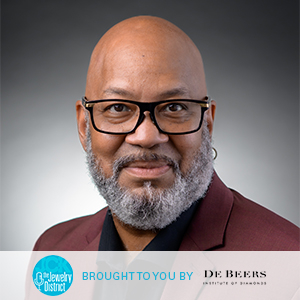
JCK editor-in-chief Victoria Gomelsky and news director Rob Bates sit down with Jeffery Bolling of Colorado-based Jeffery B. Jewelers to talk about his newest venture—KuQala Diamonds—and his journey from serving in the U.S. Army to selling diamonds to becoming Colorado’s only African American–owned full-service fine jeweler. Jeffery is playing a vital role in the diamonds-do-good story through his commitment to sourcing diamonds responsibly from companies owned by Black Africans, selling stones cut by Black African cutters, and leveraging his position and expertise to encourage greater diversity in the jewelry industry.
Listen Now
Sponsored by De Beers: institute.debeers.com
Show Notes
01:24 A Diamond Career Leads to an Epiphany
14:03 Getting the Word Out
20:36 Drawing Inspiration From Zulu Warriors
26:26 Diversity and the Bottom Line
Episode Credits
Hosts: Rob Bates and Victoria Gomelsky
Producer and engineer: Natalie Chomet
Plugs: @jckmagazine; institute.debeers.com, KuQala Diamonds
Show Recap
A diamond career leads to an epiphany
Victoria welcomes Jeffery Bolling, owner of Jeffery B. Jewelers, member of the Black in Jewelry Coalition, and founder of a new company called KuQala Diamonds, which works directly with Black African–owned diamond manufacturing companies and showcases diamonds cut by Black African cutters.
Jeffery shares his unusual backstory, which began with a part-time job at Zales after he left the military in the late 1980s and led to managing stores and selling diamonds everywhere from Alaska to Miami. From the start, Jeffery was keenly aware of the industry’s lack of diversity. “I would have Black people come into the store and be amazed that I was working there,” he recalls. He also remembers concession-stand workers shaking his hand in the early 1990s because they were happy to see a Black man at a jewelry trade show booth.
He opened Jeffery B. in 2010 and built a loyal following, bringing his son Christian, now 29, into the business. But it wasn’t until last year that his thinking about diamonds changed dramatically. “As long and as much as I’ve sold diamonds, I didn’t know the true story behind them,” Jeffery explains. He was at the 2022 GEM Awards when Stephen Lussier of De Beers received a lifetime achievement award. “He talked about the new vision of De Beers and all the good diamonds are doing. He said diamonds are building schools. People come to South Africa, Africa, and Botswana for education. There are so many more hospitals, all because of diamonds. Diamonds are doing amazing things for the people of Africa. That’s the first time I’d ever heard anybody say that in all these years.”
Though skeptical, Jeffery relayed the story to students he works with through a nonprofit group dedicated to inner-city kids. When they and their parents expressed cynicism, he knew it was time to delve deeper.
So Jeffery and Christian went to South Africa to see for themselves. They were astonished to discover how many Black African companies were cutting diamonds there, often partnering with major companies, he says. “I’d never seen cutters at the wheel who are African,” he says. “To see that level of pride and diligence in their work and the expertise they brought to the table was a proud moment for me.”
There are currently more than 20 independently Black-owned companies in South Africa that do diamond manufacturing, Jeffery says. One firm he met with had 15 cutters working; another was female-owned, with the same two women running it successfully for the past 20 years.
“That’s a story that resonates here in the United States,” Jeffery decided. “It needs to be told.” Who better to tell it than Jeffery Bolling?
Getting the word out
Rob cites the economic drawbacks for jewelry companies to cutting diamonds in places like Africa, which have higher labor costs than India and China. It’s a valid point, Jeffery concedes. The best way to counter it is to focus on stones of 30 points and up. “When you’re talking larger stones, the skill set and the price that the diamond brings definitely offsets the labor costs,” he explains. “For the expertise you’re getting, it’s going to be economical anywhere in Africa—whether in South Africa or Botswana or Namibia.”
The economic question isn’t the only hitch though, Jeffery says. The lack of financing currently available hamstrings Black African companies. “In India, there are a lot of companies that only finance diamonds, so a diamond manufacturer there can get the money to buy the rough diamonds,” he explains. KuQala’s goal is to find a way to get financing for Black African companies to buy rough stones so that they can cut and polish them and bring the gems to the United States rather than simply cutting and polishing gems for other companies.
Rob brings up the widespread skepticism about diamonds actually doing good, and asks about the best way to overcome it. “The messenger is as important as the message,” says Jeffery. It can be more credible coming from an African American man. “When I go to stores and tell them there is an opportunity to buy diamonds from Africa from Black-owned companies, brought to them by a Black-owned company,” it piques their interest, he says.
Drawing inspiration from Zulu warriors
What’s the significance of the name KuQala? “We’re going to have to fight really hard to tell this story. That made me think of the Zulu warriors,” Jeffery explains. “KuQala is a Zulu word for first…. We’re the first to try to make this move from mine to polished to the sale all through a narrative of the native people.”
So far, response has been overwhelmingly positive. “This is such a pure story,” Jeffery says. It hasn’t been told before, and many people didn’t know it was possible. What’s more, most people have no idea that “the best cutting is done in Africa,” says Jeffery.
“You’re going to be able to sell a diamond and say that not only did it come from the land, but it was actually purchased, cut, and loved by the people of the land. You can take this diamond and know that nobody in this food chain has been hurt. They were all helped.” Jeffery hopes those with the means will buy larger diamonds when they hear about KuQala. “When you spend that level of money, you’re doing a really good thing. You’re putting the money into the hands of the people who should have had it all along.”
Diversity and the bottom line
Victoria asks Jeffery for the key takeaways from the seminar on bringing diversity into marketing that he presented at JCK Las Vegas last month. As the U.S. itself becomes more diverse, jewelry stores looking to expand their business may find themselves talking to potential customers who don’t look like the clientele they’ve served in the past, Jeffery says. His best advice? “Be authentic.” That starts with diversifying your own team. “Hire people of different genders and ethnic backgrounds,” he suggests. “Have your home set in a diverse way before you invite people into it.”
Remember, too, that diversity isn’t just about helping previously disadvantaged groups or individuals. It’s about profitability. If you expand your messaging and your customer base, you stand to expand your sales, Jeffery points out. From a monetary perspective, diversity makes sound business sense, in his opinion.
- Subscribe to the JCK News Daily
- Subscribe to the JCK Special Report
- Follow JCK on Instagram: @jckmagazine
- Follow JCK on X: @jckmagazine
- Follow JCK on Facebook: @jckmagazine






